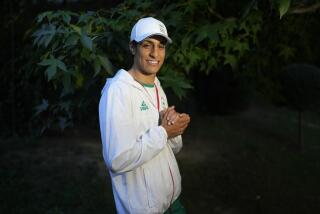Owners Unleashed at Afghan Dogfights
- Share via
KABUL, Afghanistan — Referee Rozi Mohammed longs for the good old days of pro dogfighting, when competitors had a killer instinct and the owners had brains.
The spectators’ gallery used to include government officials, intellectuals and other members of the Afghan elite. Today’s “shampoo users” spend too much time in front of mirrors, he scoffed. And in the sport’s golden age, humans left the fighting to the dogs.
At a recent Friday bout, a brawl among dog owners and fans drew the loudest cheers. After more than two decades of war, Afghans have forgotten the etiquette of one of the country’s oldest blood sports, the referee said. These days, some fans come armed with concealed knives or guns in case the canines leave any scores unsettled.
“They don’t know what a book is -- or what a dogfight is,” said Mohammed, who thinks the rabble are ruining a noble sport. “It was a gentleman’s game.”
For most of the last four decades, Mohammed has tried to bring order and fair play to the brawls between dogs with heads as big as bowling balls, fangs like daggers and impressively constructed shoulders.
Dogfighting is a big winter spectator sport, attracting high rollers from among Afghanistan’s nouveau-riche former guerrilla fighters. Some have been known to wager new Japanese cars over the outcome.
The regular Friday fights draw several thousand spectators -- men and boys only -- to an icy dirt lot on the capital’s northwestern edge. They form a large circle around more than two dozen big, barking dogs, who strain against nylon ropes and harnesses for a shot at the big time.
The dogs come from Tajik homes to the north and Pushtun homes to the south. They stand between 2 and 3 feet at the shoulders.
Some have the pure blood of Afghan mountain breeds, with thick muscles and the glistening coats of golden retrievers. Others are dark-haired mongrels that look underfed. All have ears and tails that were bobbed when the dogs were picked from the litter to be pro fighters.
The teams of owners have spent years exercising and bulking up their dogs with special formulas of grain, raw meat and milk. Some hope to win a jackpot bet; others are there for the pure blood sport of it.
During one bout, dogs went at each other on their hind legs, grappling and biting like rabid wrestlers. In minutes, the winded, bleeding rivals had their jaws locked tightly on each other’s throats, growling and panting through clenched teeth.
“Enough! Enough!” shouted the owner of the underdog. “It’s a tie!”
“No! My dog is winning!” the owner with the upper hand screamed back. “It’s not over yet!”
The losing side’s owner kicked the opposing dog, enraging its owner, and a brawl broke out. Dozens of rollicking spectators poured into the arena to get a closer look at humans fighting with bare hands.
One enthusiastic fan wielded a wooden club spiked with nails. But before human blood could be shed, police began whipping the mob with truncheons and rubber straps.
Down in the spray of mud and slush kicked up by human feet, the bleeding dogs were still clamped onto each other. The referee called it a tie, which was to his slight advantage.
Normally, only the winning team owes him a tip. With no loser, he could demand baksheesh from both teams of owners. At least one paid him just over $10.
Mohammed’s aides chased after the other team, which was parading its dog on an owner’s shoulders. Once the issue of payment was settled, the 65-year-old referee scolded the crowd.
“You elders bring the children with the dogs to fight, and when the dogs fight, the children fight along with them,” he said. “You should always be careful and teach your children. Make peace between the owners and then decide whether to fight your dog or not.”
The fans laughed and cheered. Mohammed pulled an orange from his pocket, peeled it, and shook his head in dismay.
Mamoor Shah, 31, was sure that his dog Godeer, or the Brave, had won fair and square. He hectored the referee.
“One of the other dog’s owners was saying, ‘Stop, we surrender.’ But then another one says, ‘No, don’t stop!’ ” Shah told Mohammed.
“I told you it was over, but you still continued the dogfight,” Mohammed spat back. “You made the fight dirty. What kind of hobby is this if you fight instead of the dogs?”
The referee is not happy with the sport that is his life. He says it has been going downhill for three decades, since the days before Afghans began fighting one another. For him, all the class, the heart of the game, is gone.
Shir Agha, a fighting-dog owner for 25 years, had to think back to 1973 to remember the sport’s classic match, a two-day scrap that ended when the winner killed the loser.
“It is a hobby and a love,” said Agha, a big man in a black leather jacket smeared with mud. “Many people love to have a canary in their house and listen to the bird singing. And there are many other people who like to watch dogs fight.”
Later, sitting cross-legged on the cold, dirt floor of his small home and bemoaning the sport’s decline, Mohammed became so agitated that his turban started to unwind.
Before he could face a reporter’s questions after Friday’s matches, he spent 10 minutes alone in a back room with a chillum packed full of black Afghan hashish, bound by a wet cloth to a bubble pipe.
“Wait and let me organize my mind,” Mohammed said, rubbing his furrowed brow with one hand as he fired up his pipe with the other. He also referees while stoned and claims the hash strengthens his voice. Pro dogfighting is proudly not a drug-free sport.
After his bracer, Mohammed, a former guerrilla, pulled off thick, woolen socks and rolled up his pant legs to show his war wounds. Four pet quails peeped from small, wooden cages that dangled from his sitting room ceiling.
The Soviets shot him in one leg, he said, and in a later war, Taliban soldiers stomped on the other. The Taliban considered the dogfights an offense to God and banned them.
“I was arrested by the Taliban, and they said: ‘You are the king of the game. You know everyone big.’ They were asking me for Northern Alliance commanders’ names, but I told them I was doing the work out of love and enjoyment and for the fans, not for the war.”
Mohammed is training a new fighter himself, a 10-month-old dog named Talak, or Trap. Its late father, a champion called Palang, or Tiger, killed a few opponents, Mohammed said, smiling at Talak’s prospects.
He has been raising the puppy on a diet of milk, yogurt and sheep’s liver and believes a smudge of black hair on the dog’s bobbed tail, and a fine, white line down his long snout, mark him as a born champion.
But dogs fight best in the cold, so Talak won’t be ready to defend the family name until next season. Until then, Mohammed’s only income is the tips winners might hand over.
The referee pocketed less than $100 on this Friday, not great for a seasonal wage. In a freezing wind and snow flurries, he was dressed only in three baggy, cotton shalwar kameez suits -- pants and tunic -- under an old, green vest and a black-and-white turban.
He carried a stained, white plastic whistle and a long stick wrapped in black electrical tape, strips of plastic bags lashed to the bottom. It looked like a freaky kitchen mop.
But it is the referee’s weapon, walking stick and scepter, which he holds high in front of the spectators, like a drum major leading the band.
Mohammed, one of the sport’s best-known referees, is a very intense man. He has fiery green eyes, and when he makes a point, they bulge as his head snaps forward like a striking snake.
Sometimes he snarls at the crowd or unworthy competitors, letting loose a loud, beastly sound that rises up from the back of his throat. It seems to work better on dogs than humans.
When Soviet troops invaded in 1979, Mohammed joined the rebel war that drove them out a decade later. The Soviets arrested him in one of the war’s early years.
Before Afghanistan fell apart, Mohammed was a housepainter. He wants to be one again, and to prove his dedication, he pulled out a folded, grimy color chart he keeps in a small box for the elusive day when he can return to his trade.
Mohammed doesn’t like quitters.
If he hears a dog go quiet like a loser, he’ll call it out. The referee imitated the sound with a soft, “whuff, whuff,” like the noise a well-mannered housedog might make if someone was at the front door.
Even a defeated look is fatal in Mohammed’s ring. He tilted his head to one side and winced to show the body language he sees in a done dog.
In pro dogfighting, as in life, looking like a winner is half the game.
More to Read
Sign up for Essential California
The most important California stories and recommendations in your inbox every morning.
You may occasionally receive promotional content from the Los Angeles Times.













